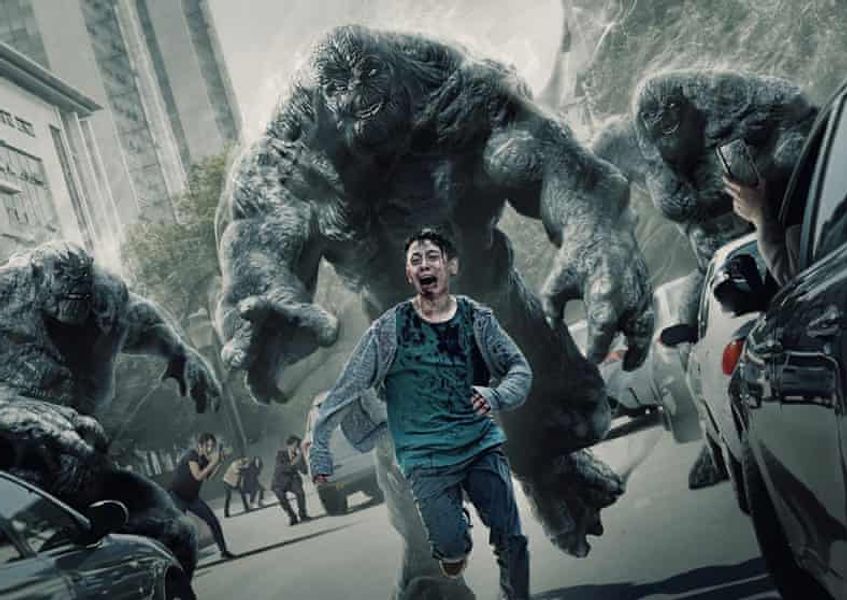After Train to Busan and Psychokinesis, Yeon Sang-ho’s Hellbound is perhaps the director’s finest work to date. Based on Choi Gyu-Seok’s popular Korean webtoon Songgot, Yeon worked in close collaboration with the illustrator to create this six-episode series. The show is a raging nihilistic look at humans hypocrisy, sin and morality, redemption, fatalism and religious fanaticism. A gory death-fest that has indelibly contributed to the current Korean pop-cultural high overtaking the world, Hellbound focused on the widespread helplessness, chaos and paranoia of a nation in the wake of supernatural events. Characters are sent on a one-way journey to hell by demonic monsters who pulverise them into a mush of ash and bones.
Dealing with the fear of the uncanny, starring Yoo Ah-In, Park Jung-min and Won Jin-Ah in prominent roles, among others, the series divides the world into two categories- ones who have sinned and the ones who have not. The juggernauts of God’s will use this opportunity to their advantage, inciting violence and blind faith in the judgement of God while innocents are left battered on the streets. The depravity of the human condition and the wrath of God that lead to imminent condemnation are overpowered by the sense of impending doom that looms large over humanity. Throughout the six episodes, the lawyer Min Hyejin and her band of rebels put up a fight against the doctrine of the New Truth and Arrowhead to get to the bottom of these bizarre supernatural occurrences. However, all the doctrines of sin and redemption get quashed when a baby named Toughie is resigned to her fate, and the death knell begins ringing for her. This makes the masses question what sins a baby could have committed, leading to such a fated ending.
After watching the bloodshed in Hwang Dong-hyuk’s Squid Game, the baby’s death would not have astonished me. However, Yeon seems to draw the line at babies and has a soft spot for them (remember how he let the pregnant woman in Train to Busan survive along with Gong Yoo’s daughter during the zombie apocalypse?). He lets Toughie live.
Toughie’s parents initially accept her fate but eventually decide to put up a fight. Along with Hyejin, they manage to ward off the demonic entities for a while before crowding around Toughie and forming a chain. The parent’s undying love and the relentless desperation to shield their child from her fated decree earns Toughie a moniker — she survives while her parents are burnt to ashes. Toughie’s survival is a transgressive act that seemingly defies the alleged God’s will that the blatant fanatics at New Truth preach. The public, who were previously under the enchanted spell of the church’s doctrines, finally learn to question these beliefs. A commentary on fate and free will, the ultimate sacrifice on the part of Toughie’s parents, much like Lily Potter from Harry Potter, proves that these punishments are not confined to being meted out to sinners. It could happen to absolutely anyone.
The question remains- who are the actual monsters? Are they the trio of mutant-like CGI forces, or are they the ones preaching God’s word and inciting violence? Yeon’s show seems to be echoing what Mephistophilis tells Faustus in Christopher Marlowe’s Doctor Faustus: “Hell hath no limits, nor is circumscribed, In one self place, for where we are is hell, And where hell is must we ever be.” Hell is no longer a place for sinners as it becomes a state of mind on the show.
Yeon attributed to the same by saying, “When we were working on this story, we were set on creating a world that was comparable to hell and created by people who are unable to tolerate uncertainty and we wanted to show what the society would look like when convictions are in conflict with one another.”
However, the final surprise at the end of the series is when Park Jungja’s burned body comes back to life. Jungja was the first person whose death was showcased as a public spectacle. While the VIPs, who paid hefty amounts to experience her gruesome battery, sat on chairs in the front row, Jungja was mercilessly murdered and burned to ash and bones by the grotesque beings. However, the final scene of Hellbound Jungja’s body, which is kept in a museum, dramatically and mysteriously reanimates and comes back to life. Naked and sweaty, she seems petrified as she stares listlessly into the camera. This creates a major entry point into season two, where Jungja might be able to narrate her experiences in Hell. Her resuscitation also blurs the line between sinners and saints and quashes the doctrines of the religious zealots.
Yeon’s horrifying and successful commentary on the pathetic and bleak condition of modern man set in an alternate universe terrifies the bravest of hearts and leaves the viewers on edge with burning questions that serve as a perfect narrative juncture for a potential season two.
